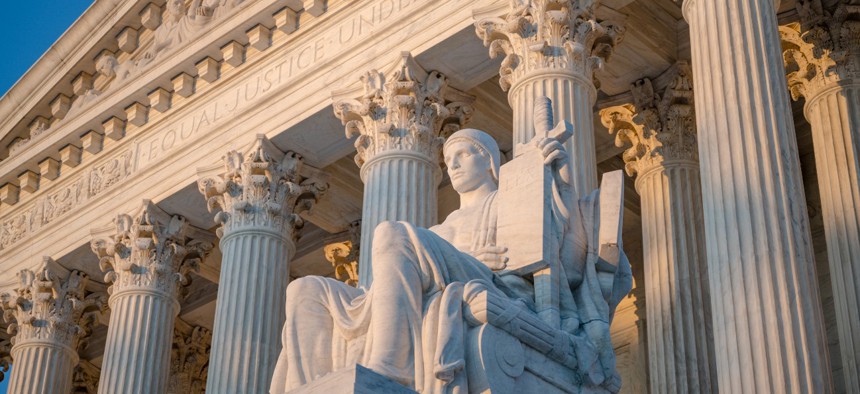
The decision raises questions about the recourses individuals have when seeking to challenge potentially improper actions by federal personnel. Richard Sharrocks / Getty Images
Agency Doesn’t Have to Reconsider Benefits Decisions After Misinterpreting the Law, Supreme Court Rules
Opponents call it "inexcusable" to deny a veteran a new hearing after VA admitted it made a mistake.
The Veterans Affairs Department does not have to conduct a new hearing to determine whether a former Marine Corps member deserves disability benefits even after the agency admitted it was relying on a faulty interpretation of the law when it first denied the man’s claim, the Supreme Court ruled on Wednesday.
For the second time in as many weeks, the court raised questions about the recourses individuals have when seeking to challenge potentially improper actions by federal personnel. Federal statute allows veterans to seek reconsideration of a benefits denial at any time when the rejection resulted from a “clear and unmistakable error.” Such errors occur under a “narrow” and “limited” set of circumstances, the court said in a 6-3 decision in George v. McDonough, and do not include when decisions were made under regulations that were subsequently changed to bring them into compliance with existing law.
Kevin George joined the Marine Corps in 1975 without disclosing he had suffered recent schizophrenic episodes. He experienced another such episode less than a week into training and was dismissed from the service. He argued he was entitled to disability benefits as his short service exacerbated his condition, but VA denied his claim. At the time, VA could reject claims simply by demonstrating veterans' conditions predated their service. In 2003, however, the department conceded that interpretation was unlawful and announced that it would instead have to prove veterans' service did not aggravate pre-existing conditions.
While decisions on disability benefits are generally considered final and irreversible after veterans exhaust their initial appeals—as George did in 1977—Congress authorized the “clear and unmistakable error” exception. George re-challenged his benefits denial to VA’s Board of Veterans Appeals in 2014, arguing such an error had occurred when the department originally relied on a faulty interpretation of the law. The board rejected the argument, with the Supreme Court eventually following suit.
In a majority opinion written by Justice Amy Coney Barrett, the high court ruled an agency changing its interpretation of a law or regulation did not constitute a clear and unmistakable error. VA admitting it got the regulation wrong initially did not change that basic principle, the court said, adding the decision in George’s case was not wrong at the time.
“The correct application of a binding regulation does not constitute ‘clear and unmistakable error’ at the time a decision is rendered, even if that regulation is subsequently invalidated,” Coney Barrett wrote. She added that statutory language regarding agency errors was unique to VA and had never been clearly defined.
In a dissenting opinion, Justice Neil Gorsuch said VA’s failure to provide George the “courtesy” of a new hearing was “inexcusable.” Gorsuch suggested the majority opinion could have wider reaching implications, arguing no agency should face immunity when making decisions under false pretenses.
“Even if an agency’s unlawful regulations may bind its own employees until a court says otherwise,” Gorsuch wrote, “that does not mean its decisions applying those regulations to others are error-free.”
Gorsuch also recognized, however, that Congress has provided special recourses for “those who have left private life to serve their country.” He added the majority opinion would impact “countless other decisions” made by VA.
In a separate dissent, Justice Sonia Sotomayor said agencies should not be able to use their own mistakes to protect themselves against further scrutiny.
“The mere fact that the board relied on a plainly invalid regulation does not shield its final decision from review based on clear and unmistakable error,” Sotomayor said.
The decision follows one last week in which the Supreme Court ruled individuals had little recourse in response to potential improper action by federal personnel. In Egbert v. Boule, the court ruled federal officers should generally not be subject to lawsuits alleging excessive force as doing so could prove detrimental to national security.







